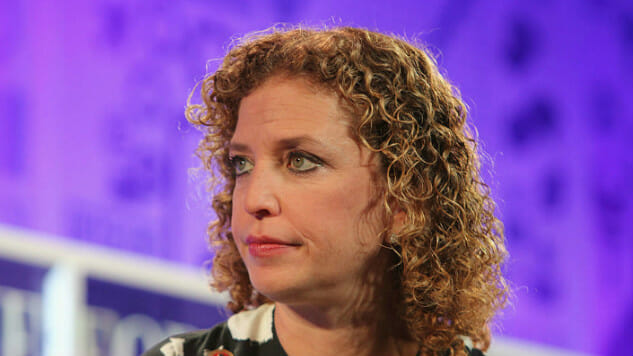
The hashtag ”#DemExit” first surfaced after the announcement of the “Brexit” vote in the United Kingdom, as a warning to the Democratic Party that progressives will change their registrations if Hillary Clinton were to win the nomination. It was a way of saying, “They did it there, we can do it here!” Now that Clinton is officially the Democratic nominee, it has become a rallying cry on social media.
The logic goes that such action is necessary to show the Democratic National Committee that its behavior during the 2016 primary was unacceptable. The sentiment is completely understandable.
With the each new DNC email leak, it becomes more apparent that the 2016 Democratic presidential primary was slanted. At the highest levels of party leadership there existed a culture of bias in favor of Hillary Clinton. As if that wasn’t bad enough, the image of Occupy-smasher Michael Bloomberg speaking at the DNC, along with the recent video released by The Intercept, of Democratic lawmakers lauding corporate donations is certainly enough to make any progressive’s skin crawl.
For me, however, there is a disconnect.
The DemExit solution seems exactly what the Democratic establishment wants.
Party leaders like Debbie Wasserman Schultz and Hillary Clinton, who lean center-right, would love nothing more than to be able to stop worrying about Bernie Sanders’ movement and its demands. These politicians have little to fear from a fractured progressive movement that has been marginalized because it divided into the same smaller, more ideologically pure factions it began as.
The most important thing Sanders did for the left was unite it and carve out a place for it in the Democratic Party. DemExit, at least now before a viable third party exists, undermines those efforts, and lets the establishment off easy for what we now know was a stacked primary election.
Progressives should not abandon everything Sanders fought so hard for including the new Democratic platform (which needs work, but is a start), changes to the party rules, and of course, the thousands of Berniecrats who signed up to run for office nationwide and need primary votes—including Schultz’s opponent, Tim Canova.
And this all leads me to one conclusion:
The DemExit is premature
Bernie Sanders was the favorite of independent voters of all the candidates running. According to a Gallup poll from April, most independents lean towards one party or the other: 41 percent Democratic, 36 percent Republican, and just 23 percent have no preference (those who FiveThirtyEight calls “true independents). By the end of May, Sanders was outperforming both Clinton and Trump among Democratic-leaning independents and true independents.
However, he still did not secure the nomination.
Preference aside, there is no denying that closed primaries in liberal states hurt Sanders. In New York the deadline to switch one’s registration was October 9, 2015—before the Vermont Senator really had widespread name recognition.
As the Huffington Post reported in April:
So if you’re an independent who’s been following the campaigns and recently made up your mind — or if you just weren’t aware of the registration deadline — you’re left out in New York.
On top of that, millions of New Yorkers say they didn’t miss the deadline. They totally registered. But there were problems. Some say their paperwork didn’t get received and processed.
Others say their registration was mysteriously switched from Democrat to something else. Or purged entirely. Over 60,000 Democrats in Brooklyn alone disappeared from the voter rolls.
Clinton ended up sweeping the Empire State because her voters were older, longtime Democrats. All over the country were reports of independent Sanders supporters trying to have their voices hear, but being shut out due to technicalities over their registration.
The case has been made that open primaries negate the need to be registered Democrat, but as we saw with the California primary that can still be problematic. The Democratic Party in California has a rule that only unaffiliated voters and registered Democrats can vote in its open primary. This year, thanks to confusion—hundreds of thousands registered to the American Independent Party mistakenly believing it was the same as registering independent—many independents were unable to cast a ballot for either Sanders or Clinton.
Progressive voters must learn the lessons of the 2016 Democratic Primary so that when the next candidate who comes up worth voting for, their voices will be heard. Bernie Sanders, a lifelong independent, registered as a Democrat because he recognized that the new progressive movement he has mobilized, needs the weight of a major political party behind it—both in terms of legitimacy and votes.
Bernie Sanders gave progressives the key to accomplishing their goals: get involved. While that does not mean actually voting for the “lesser of two evils,” it does mean maintaining party affiliation at least until a viable alternative comes up. If anything it would send a greater message if Berners were able to lower the percentage of registered Democrats who actually vote for the party’s candidates. At the same time, it could send positive reinforcement by raising turnout for candidates who are real progressives.
Before there is any more talk of DemExit, lets work to get the Green Party federal funding; lets get it on the ballot in all 50 states’ lets get Jill Stein to the debates. Then, once we see how many votes Jill Stein actually gets in November, we can, as a movement decide a direction.
For now, though, I’d like to propose a new hashtag: #StayBlueVoteGreen.